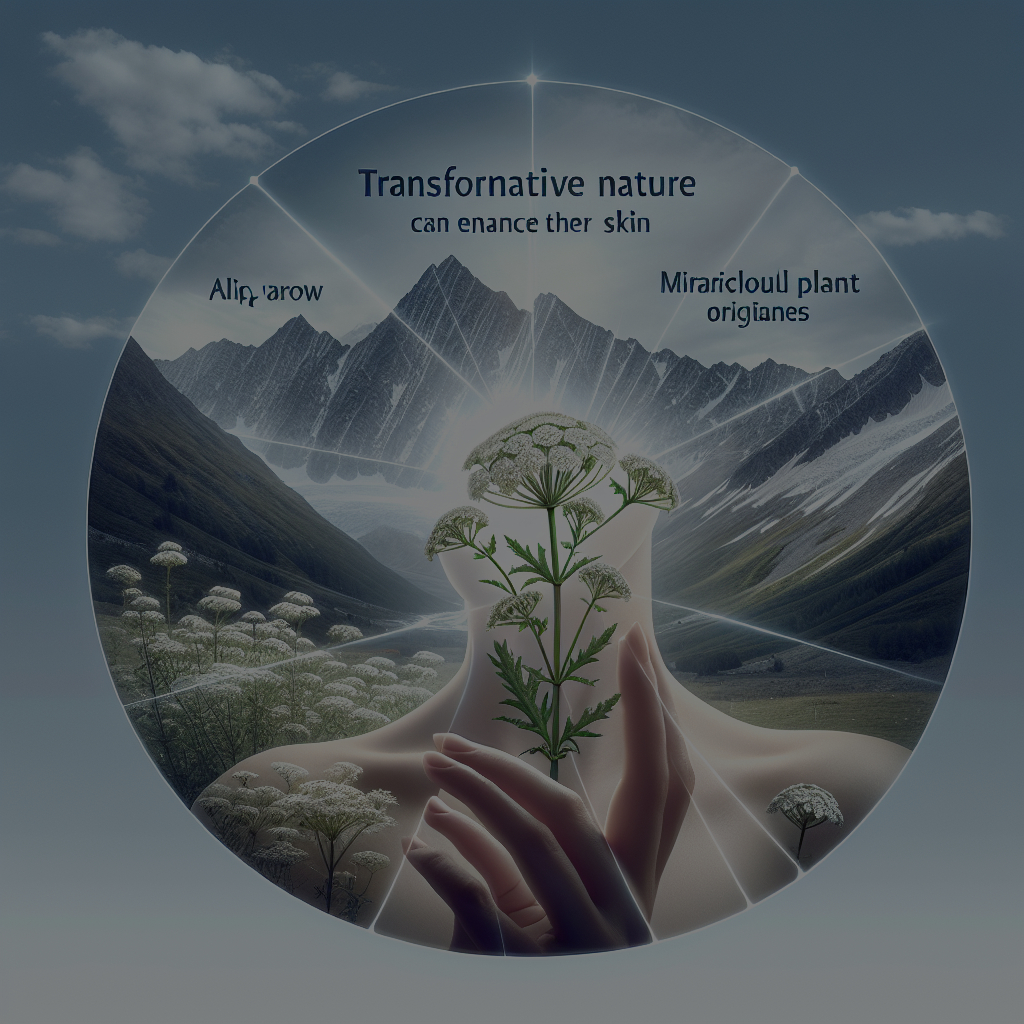
Yarrow, a resilient herb found in the pristine environments of the Alps, has been celebrated for its remarkable skin-transforming properties. This article delves into the myriad benefits of yarrow, exploring how this alpine treasure can revolutionize your skincare routine.
The Historical Significance of Yarrow
Yarrow, scientifically known as Achillea millefolium, has a rich history that dates back to ancient civilizations. Named after the Greek hero Achilles, who is said to have used the herb to treat his soldiers’ wounds, yarrow has been a staple in traditional medicine for centuries. Its healing properties were well-known among the ancient Greeks, Romans, and even Native American tribes.
In the context of skincare, yarrow’s historical use is equally impressive. Ancient texts reveal that yarrow was often used to treat skin ailments, reduce inflammation, and promote wound healing. The herb’s ability to thrive in the harsh conditions of the Alps only adds to its mystique, as it suggests a resilience and potency that can be harnessed for modern skincare needs.
Traditional Uses in Skincare
Historically, yarrow was used in various forms, including poultices, infusions, and ointments. These traditional applications were aimed at treating a range of skin issues, from minor cuts and abrasions to more severe conditions like eczema and psoriasis. The herb’s anti-inflammatory and antiseptic properties made it a go-to remedy for promoting skin health and accelerating the healing process.
Moreover, yarrow was often combined with other herbs to enhance its efficacy. For instance, it was mixed with chamomile and calendula to create soothing balms for irritated skin. These traditional formulations laid the groundwork for modern skincare products that harness the power of yarrow.
The Science Behind Yarrow’s Skin Benefits
Modern scientific research has validated many of the traditional claims about yarrow’s skin benefits. The herb is rich in bioactive compounds such as flavonoids, tannins, and essential oils, which contribute to its therapeutic properties. These compounds work synergistically to provide a range of benefits for the skin.
Anti-Inflammatory Properties
One of the most well-documented benefits of yarrow is its anti-inflammatory effect. Inflammation is a common underlying factor in many skin conditions, including acne, rosacea, and eczema. Yarrow’s anti-inflammatory compounds help to reduce redness, swelling, and irritation, making it an effective treatment for these conditions.
Studies have shown that yarrow can inhibit the production of pro-inflammatory cytokines, which are molecules that play a key role in the inflammatory response. By reducing the levels of these cytokines, yarrow helps to calm inflamed skin and promote a more balanced complexion.
Antiseptic and Antimicrobial Effects
Yarrow’s antiseptic and antimicrobial properties make it a powerful ally in the fight against skin infections. The herb contains compounds that can kill or inhibit the growth of harmful bacteria, fungi, and other microorganisms. This makes yarrow particularly useful for treating acne, as it helps to keep the skin clean and free from the bacteria that cause breakouts.
Additionally, yarrow’s antimicrobial effects can help to prevent infections in minor cuts and abrasions, promoting faster healing and reducing the risk of scarring. This makes it an excellent ingredient for first-aid skincare products.
Antioxidant Activity
Oxidative stress, caused by free radicals, is a major contributor to skin aging and damage. Yarrow is rich in antioxidants, which help to neutralize free radicals and protect the skin from oxidative stress. This antioxidant activity helps to prevent the breakdown of collagen and elastin, two proteins that are essential for maintaining skin’s firmness and elasticity.
By protecting the skin from oxidative damage, yarrow helps to reduce the appearance of fine lines, wrinkles, and other signs of aging. This makes it a valuable ingredient in anti-aging skincare formulations.
Incorporating Yarrow into Your Skincare Routine
Given its impressive range of benefits, it’s no surprise that yarrow is becoming a popular ingredient in modern skincare products. From cleansers and toners to serums and moisturizers, there are many ways to incorporate yarrow into your daily skincare routine.
Yarrow-Infused Cleansers
Cleansers that contain yarrow extract can help to gently purify the skin without stripping it of its natural oils. The herb’s antimicrobial properties help to keep the skin clean and clear, while its anti-inflammatory effects soothe any irritation or redness. Look for cleansers that combine yarrow with other gentle, hydrating ingredients for the best results.
Soothing Toners
Toners are an excellent way to incorporate yarrow into your skincare routine, as they help to balance the skin’s pH and prepare it for the next steps in your regimen. Yarrow-infused toners can help to calm inflamed skin, reduce redness, and provide a burst of hydration. Apply the toner with a cotton pad or spritz it directly onto your face for a refreshing boost.
Hydrating Serums and Moisturizers
Serums and moisturizers that contain yarrow extract can provide deep hydration and nourishment for the skin. These products often combine yarrow with other hydrating ingredients like hyaluronic acid, glycerin, and botanical oils to create a powerful, skin-loving formula. Use a yarrow-infused serum or moisturizer as part of your morning and evening routine to keep your skin soft, supple, and radiant.
Targeted Treatments
For those dealing with specific skin concerns, targeted treatments that contain yarrow can be highly effective. For example, spot treatments for acne can benefit from yarrow’s antimicrobial and anti-inflammatory properties, helping to reduce the size and redness of blemishes. Similarly, balms and ointments for eczema or psoriasis can help to soothe and heal irritated skin.
DIY Yarrow Skincare Recipes
If you prefer a more hands-on approach to skincare, you can also create your own yarrow-infused products at home. Here are a few simple recipes to get you started:
Yarrow Facial Steam
- 1 tablespoon dried yarrow flowers
- 1 tablespoon dried chamomile flowers
- 1 tablespoon dried lavender flowers
- Boiling water
Combine the dried herbs in a large bowl and pour boiling water over them. Lean over the bowl with a towel draped over your head to trap the steam. Allow the steam to penetrate your skin for 5-10 minutes, then rinse your face with cool water. This facial steam helps to open pores, cleanse the skin, and provide a soothing, aromatic experience.
Yarrow-Infused Facial Oil
- 1/4 cup dried yarrow flowers
- 1/2 cup carrier oil (such as jojoba, almond, or olive oil)
- Glass jar with a lid
Place the dried yarrow flowers in the glass jar and cover them with the carrier oil. Seal the jar and place it in a sunny spot for 2-4 weeks, shaking it gently every few days. After the infusion period, strain the oil to remove the flowers and transfer the infused oil to a clean bottle. Use a few drops of this yarrow-infused facial oil as part of your skincare routine to nourish and hydrate your skin.
Conclusion
Yarrow from the Alps is a true skincare powerhouse, offering a range of benefits that can transform your skin. From its anti-inflammatory and antimicrobial properties to its antioxidant activity, yarrow is a versatile and effective ingredient that deserves a place in your skincare routine. Whether you choose to use yarrow-infused products or create your own DIY formulations, this alpine herb can help you achieve healthier, more radiant skin.

